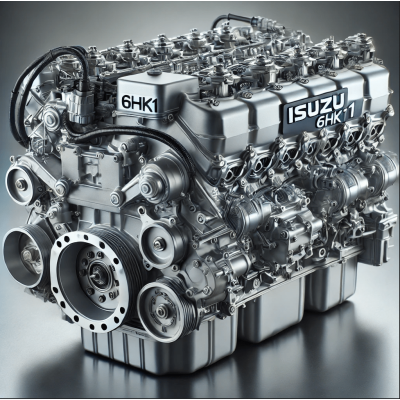
Possible malfunctions of Isuzu 6HK1 engines
Isuzu's 6HK1 engines are one of the most popular diesel engines used in specialty equipment due to their power, efficiency and reliability. They are ideal for heavy-duty applications and those requiring significant power output.
Isuzu 6HK1 engines are installed in heavy and medium-duty excavators, including Hitachi and Isuzu, as well as in quarrying and mining equipment, construction equipment and other machinery.
Despite the reliability of these engines, certain malfunctions may occur during intensive operation or in the absence of proper maintenance of the machines
- Problems with the fuel system:
Problems with the fuel pump: Under high loads, wear and tear on the fuel pump can lead to insufficient fuel delivery, which affects engine performance
Clogged fuel injectors : Due to inadequate cleaning of the fuel filter or use of poor quality fuel, may cause increased exhaust emissions and erratic engine operation
- Engine overheating:
Thermostat malfunction: thermostat stuck in the open position - can cause the engine to overheat
Problems with the radiator: leaking fluids and clogged radiator also lead to poor cooling, causing the engine to overheat
Water pump malfunction: failure of the water pump, which is responsible for circulating the coolant, can also cause the engine to overheat
- Turbine wear
The 6HK1 engine is equipped with a turbocharger, so problems with the turbocharger are possible
Wear of the turbine blades: intensive use may result in reduced turbocharging performance and damage to the blades.
Clogged oil passage: The turbine is a part of the engine that requires a constant supply of oil. If the oil is not flowing properly to the turbine due to clogging, it can cause overheating and damage.
- Oil leaks
Problems with oil seals: over time, oil seals can lose their elasticity and tightness, leading to oil leaks
Wear of gaskets: as the engine operates intensively, gaskets wear out (cylinder head gasket, valve cover gasket)
- Wear of the valve train
Over time, the valves and their seats can wear out. This can lead to compression problems, unstable engine operation, or loss of power.
- Cooling system malfunctions
Radiator clogging: Scale and dirt build up in the cooling system reduces effective heat transfer
Coolant leakage: leaking radiator or damaged hoses can cause insufficient antifreeze and cause overheating
- EGR and possible valve problems
Clogging of the EGR valve: The valve is prone to carbon deposits, which can cause it to malfunction. The engine will not run efficiently and emissions will increase.
- Sensor malfunction
Failure of the temperature sensor and oil pressure sensor:
Oil pressure sensor or temperature sensor malfunction This can cause incorrect signals to be sent to the electronic control unit (ECU), which in turn can lead to incorrect engine operation or an error
- Worn piston rings
Worn piston rings can lead to increased oil consumption, smoke from the exhaust system, and loss of cylinder compression
It is worth knowing to prevent the above breakdowns:
- It is mandatory to use high-quality fuel and oil. This will help prevent contamination of the fuel system and reduce wear and tear on parts
- Inspection of the cooling system. It is imperative to prevent engine overheating, which requires periodic checking and replacement of the coolant
- Regular maintenance. Timely replacement of oils, filters and regular checking of fluid levels will help you avoid most possible malfunctions.




